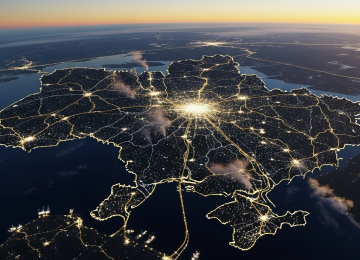“`html
Trump Threatens RUSSIA Sanctions AGAIN: Is This Just A Gimmick or A Geopolitical Game-Changer?

The world holds its breath as the specter of a renewed, or perhaps just a hyped, threat from former President Donald Trump looms large over the ongoing Russia-Ukraine conflict. With no discernible peace deal in sight and the global stage perpetually teetering on the brink of a larger conflagration, Trump, in his characteristic, bombastic style, has once again invoked the specter of sanctions against Russia. But is this merely another headline-grabbing pronouncement from a man who thrives on them, or does it signal a seismic shift in American foreign policy, potentially dictated by the unpredictable currents of a looming presidential election? The implications for global stability are immense, and the international community is scrambling to decipher the true intent behind these pronouncements.
The Unpredictable Trump Doctrine: Sanctions as a Lever?

Donald Trump’s approach to foreign policy has always been characterized by its deviation from established diplomatic norms. While traditional administrations rely on multilateral agreements and carefully calibrated diplomatic overtures, Trump often employs a strategy of disruption, shock, and personal negotiation. His past pronouncements on Russia have been a veritable kaleidoscope of contradictory signals, ranging from admiration to outright condemnation, and now, a renewed threat of sanctions. This isn’t the first time Trump has flirted with the idea of imposing or lifting sanctions on Russia, a tactic that has consistently kept both allies and adversaries guessing. His supporters might argue this is a sign of his strength, his willingness to wield economic power unilaterally to achieve his objectives. Critics, however, see it as a dangerous and unpredictable gamble that undermines established international alliances and emboldens authoritarian regimes.
The current geopolitical climate is exceptionally fragile. The war in Ukraine, now a protracted and bloody conflict, has had ripple effects across the globe, impacting energy prices, food security, and international relations. The Biden administration has consistently maintained a policy of robust support for Ukraine, including the imposition of stringent sanctions against Russia. Trump’s pronouncements, therefore, represent a direct challenge to this established policy. His suggestion that he might impose sanctions, without specifying the nature or the trigger, injects a new layer of uncertainty into an already volatile situation. It raises the crucial question: what would be the impetus for these new sanctions? Would they be tied to a specific escalation by Russia, or would they be a preemptive strike, a bargaining chip in a potential future negotiation?
Election Year Maneuvering: Playing to the Base?

It is impossible to divorce Trump’s pronouncements on foreign policy from the ever-present backdrop of American presidential elections. With the next election cycle already in full swing, his statements are often scrutinized for their potential impact on his electoral prospects. Some analysts suggest that these threats of sanctions are not necessarily about Ukraine, but rather a strategic move to appeal to a specific segment of his voter base. A tough stance on Russia, even if contradictory to past statements, can resonate with voters who prioritize national security and a strong American presence on the world stage. Conversely, for those who believe Trump’s previous overtures towards Russia were genuine attempts at de-escalation, this might be seen as a confusing U-turn.
The narrative Trump has cultivated is one of being an outsider, someone who is willing to challenge the status quo and strike unconventional deals. His willingness to even consider sanctions, after years of suggesting he could “get along” with Putin, is a complex signal. Could this be a calculated attempt to appear decisive and in control, even if the specifics remain vague? Or is it a genuine evolution of his thinking, perhaps influenced by new information or a recalibration of his geopolitical priorities? The uncertainty itself is a powerful tool in Trump’s arsenal, keeping opponents off balance and media attention fixed upon him. The danger, however, lies in the potential for genuine policy to be sacrificed on the altar of political expediency.
The Global Reaction: Confusion, Caution, and Concern

The international reaction to Trump’s latest threats has been a mix of bewilderment and apprehension. Allies of the United States, particularly those in Europe who have borne the brunt of Russia’s aggression, are accustomed to a more predictable and collaborative approach to foreign policy. The prospect of a unilateral shift in sanctions policy, potentially undermining years of coordinated efforts, is a significant cause for concern. European leaders have consistently emphasized the need for a united front against Russian aggression, and any deviation from this could weaken the collective pressure. There is a palpable fear that a Trump administration might seek a rapid resolution to the Ukraine conflict, even if it comes at the expense of Ukrainian sovereignty or democratic principles.
Russia, on the other hand, is likely viewing these pronouncements with a degree of calculated indifference, perhaps even amusement. Trump’s past rhetoric has often suggested a willingness to engage directly with Putin, bypassing traditional diplomatic channels. This could be interpreted by the Kremlin as an opening for a new set of negotiations, albeit on terms potentially favorable to Russia. The effectiveness of sanctions is also a point of contention, with Russia having proven remarkably resilient in the face of Western economic pressure. Therefore, the mere threat of sanctions, without a clear framework, might be dismissed as mere bluster. However, the potential for unpredictability remains a factor; a sudden imposition of new sanctions, even if arbitrary, could still disrupt Russian economic planning.
The Unanswered Questions: What’s the End Game?

The core of the issue, and the reason for the global consternation, lies in the profound lack of clarity surrounding Trump’s intentions. What specific actions by Russia would trigger these new sanctions? What would be the scope and duration of these sanctions? And most importantly, what is the ultimate objective? Is it to force Russia to the negotiating table on more favorable terms for Ukraine, or is it a more transactional approach, seeking a quid pro quo for American cooperation on other fronts? The absence of these details leaves the international community vulnerable to miscalculation and policy drift. The BBC’s authoritative reporting on international affairs often emphasizes the importance of clarity and predictability in diplomacy, qualities that are, to say the least, in short supply in this instance. Conversely, the Times of India’s penchant for sensationalism might capture the sheer audacity of the statement, but perhaps less of the nuanced implications.
Trump’s approach to foreign policy has always been about leverage and disruption. He has a history of using threats, including the threat of sanctions, as a negotiating tactic. The question is whether this particular threat is a genuine policy shift or a continuation of his established pattern of using uncertainty to gain an advantage. If it is the latter, then the world must brace itself for another period of geopolitical turbulence, where the stability of international relations is held hostage by the whims of one individual. The fate of Ukraine, and indeed the broader global order, may well hinge on the answer to this question. The world watches, with a mixture of hope and dread, to see if Trump’s latest pronouncement is a call for peace through strength or a dangerous flirtation with global instability.
Conclusion: A Risky Gamble on the Global Stage

Donald Trump’s renewed threat to impose sanctions on Russia, amidst the ongoing Ukraine conflict, is a geopolitical gambit of monumental proportions. It is a move that defies easy categorization, oscillating between the authoritative pronouncements of seasoned diplomacy and the sensational, headline-grabbing tactics of a political showman. Whether this is a calculated strategy to reshape the global order or a mere election-year maneuver remains to be seen. The lack of concrete details, the unpredictable nature of his foreign policy, and the inherent fragility of the international landscape all contribute to an atmosphere of profound uncertainty. The implications for Ukraine, its allies, and the broader architecture of global security are immense, and the world is holding its breath, waiting to see if this latest threat translates into tangible action or simply fades into the cacophony of political discourse. The stakes, as always when Donald Trump speaks on foreign policy, could not be higher.
“`
















